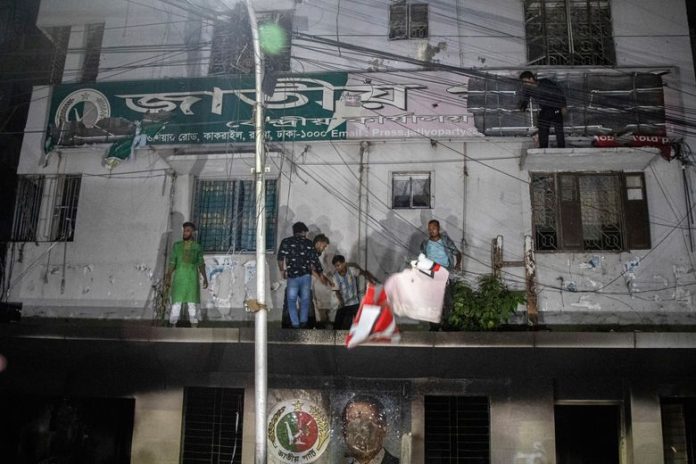Attackers set fire on Thursday night to the headquarters of a Bangladesh party supporting ousted leader Sheikh Hasina, media reports said.
No one has claimed responsibility for the attack on the Jatiya Party office in the Bangladeshi capital Dhaka. TV channels and other media reported that the attackers stormed the party headquarters in Dhaka’s Bijoy Nagar neighbourhood, clashed with party members there and eventually set the premises on fire. No information was reported on whether there were any casualties.
The extent of the damage was not immediately known. According to Rashed bin Khaled, a fire and civil defence official, firefighters rushed to the scene. Bin Khaled, who spoke to The Associated Press by phone, gave no other details.
The party is Bangladesh’s third-largest and was founded by former military dictator H.M. Ershad in the 1980s.
At the time of the attack, a prominent leader of the student protest movement that led to Hasina’s ouster from power in August said the Jatiya Party should be “destroyed” for supporting her government.
Hasnat Abdullah, a student leader, said in a Facebook post that the Jatiya Party is a “national traitor.”
Abdullah is a spokesman for the Anti-Discrimination Student Movement, which led the July protests. He also called on students to gather at Dhaka University and march to the Jatiya Party headquarters.
Hasina’s Bangladesh Awami League party has ruled the country for 15 years, since 2009. Its critics say the Jatiya Party acted to give Hasina’s rule a semblance of democracy as other major political parties did not participate in the elections.
Protests against Sheikh Hasina
Protests in Bangladesh began in July, with demonstrators demanding the abolition of the job quota system for relatives of the 1971 war of independence. Anti-government protests erupted with renewed vigour on August 4 when protesters demanded the resignation of Prime Minister Hasina. On August 5, head of government Sheikh Hasina left office amid widespread protests and flew to India.
After the Prime Minister fled, President Mohammed Shahabuddin ordered the release of detained protesters as well as former Prime Minister and opposition leader Khaleda Zia.
Amid the protests, Bangladesh imposed a curfew and restricted internet access.
